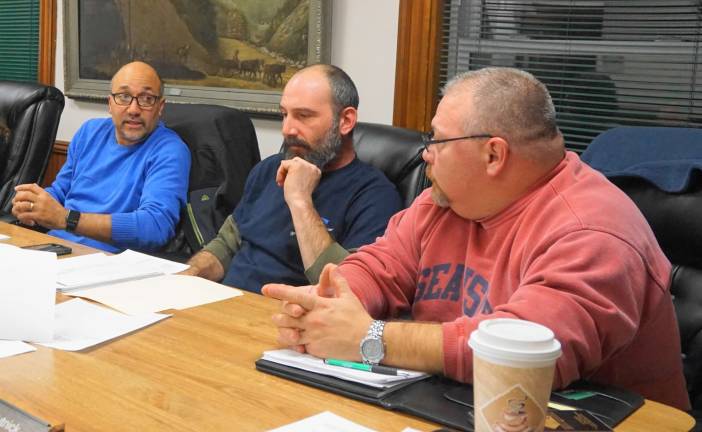Ogdensburg council on Path to Progress

OGDENSBURG — Councilman David Astor reviewed the proposed N.J. Path to Progress, Dec. 10, at the Ogensburg Council meeting. He said, N.J. Senators Steve Oroho and Stephen Sweeney are trying to find an extra $8 billion dollars by the year 2020, in order to pay for state necessities and pay back the increased pension system.
Astor explained, Oroho and Sweeney had discussed their proposal at a municipalities meeting, using “pension and healthcare in the same breath.”
He said they spoke of how the state had raided the pension system. Now, in order to pay back the raid, Astor continued, they are talking about a big push for shared services in local government — even possibly legislating shared services — along with small municipalities merging with large municipalities.
In addition, Astor said, there is a push to eliminate all K-4, 5-6, and K-8 school districts, making just K-12 regions. He continued, any school district with less than 500 students would be eliminated.
“This is their Path to Progress,” he said, and they want the municipalities to promote the plan to the tax payers, “because the $8 billion is coming from them. The tax payers, have to stand up and revolt.”
A lot of people, Astor continued, are buying into the Path to Progress. In the past, he said, Ogdensburg residents had really spoken out against merging police departments with Sparta.
He said he has the full packet of why it needs to be done – “the doom and gloom; the whole world is going to blow up if this isn’t done by 2020. This is (State Sen. Steve) Oroho’s baby. Oroho is working with Sweeney. It is a bipartisan issue.”
Mayor Rachel Slater asked if it goes forward through the state, would the school become regional?
Astor said he was told, Ogdensburg is staying open — just getting rid of a superintendent and a business administrator. However, Ogdensburg staying open, he said is contrary to the Path to Progress, which pushes to eliminate schools with less than 500 students.
Realistically, Astor said, Oroho and Sweeney know it is a tough battle to pass the Path to Progress. Right now, he said, the state is strangling the school, by cutting state funds. In five years, he added, the state said they would cut $860,000 from the school, quite difficult for the school to survive. Now they are adding the Path to Progress, Astor said, trying everything possible to consolidate the municipalities.
Mayor Elect George Hutnick asked if the Path to Progress had been done, and done successfully in any other state?
Astor said, “Yes, it has been done, but no, there hasn’t been a lot of success – but Jersey’s going to be different.”
Councilman Anthony Nasisi said, there did not seem to be much benefit to the kids and their education, by increasing classroom size.
Hutnick commented, “All they’re going to do is bus them around.”
Astor asked, how the borough would benefit from merging with another town, like Sparta, Franklin or Hardyston; would they really care for Ogdensburg; and how much money would it really save? He observed, the tax impact had definitely taken its toll on Ogdensburg, with a lot of foreclosures and people walking away from homes. However, he noted, they had seen a turn and people were coming back and buying houses.
“We’ve kind of weathered the storm,” he said.
Astor said he is concerned about the borough's future. if it does not have a school. Personally, he said, he had moved into Ogdensburg because of the great small town community and great school – just what he had wanted as he was starting a family.
“If you think Main Street is empty now, Wait and see,” Nasisi said.
Hutnick asked about having a town hall at the firehouse with the residents.
The council agreed they want Oroho and Sweeney to come explain the idea to the townspeople.
Councilman Michael Nardini suggested sending a mailer to the residents, telling what services will be discussed.
In August, Oroho had commented about the unfunded pension liabilities and growing healthcare costs for public employees, which he had said, “are no surprise to anyone.” He also said, the state will “soon face the additional burden of a massive Cadillac tax under the Affordable Care Act if we do nothing to reduce health benefit costs further.” In conclusion, he observed, “It’s clear that bold reforms are necessary to fix the structural deficiencies that threaten the financial future of every New Jerseyan.”